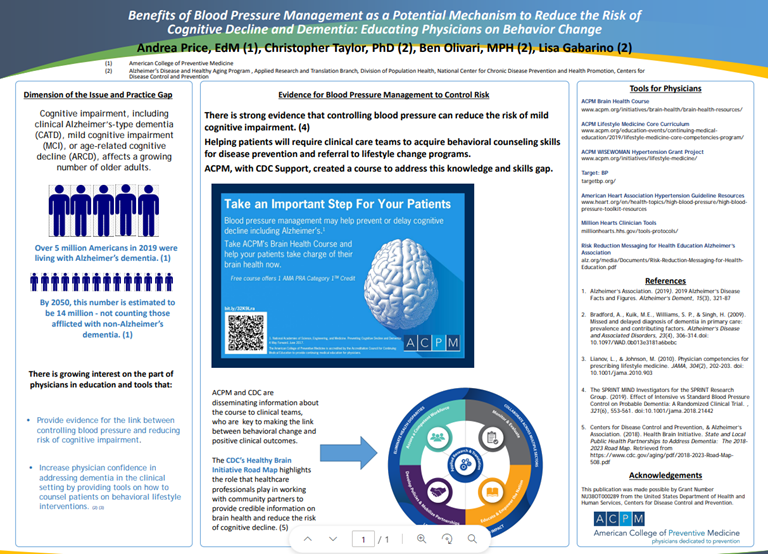ACPM is committed to educating health care professionals about the wide array of preventive measures that can help protect brain health. Key among these are blood pressure control and other modifiable risk factors as a possible mechanism for reducing the risk of future impaired brain health and cognitive decline.
Key Deliverables from Grant-Funded Projects
With funding from the Centers for Disease Control and Prevention (CDC), ACPM developed educational tools and Continuing Medical Education (CME) opportunities focusing on the connection between lifestyle medicine and brain health to evaluate dementia risk reduction strategies and increase providers' awareness of Alzheimer’s Disease and Related Dementias (ADRD) as a serious health concern. These resources are designed to improve healthcare professionals’ ability to assess, diagnose and refer patients to evidence-based programs focused on addressing lifestyle factors for preventing the onset of cognitive decline and other brain-related health conditions.Continuing Medical Education (CME)
Heart Healthy is Brain Healthy: Cognitive Decline and Dementia Risk Reduction through Blood Pressure Control Cognitive impairment, including clinical ADRD, affects a growing number of older adults. Given the impact of cognitive impairment on society, there is increasing interest in evidence-informed risk reduction. Learn how to utilize blood pressure control in middle-aged adults to reduce the risk of cognitive impairment later in life by taking this course today. Earn 1.5 CME upon completion.
Improve your awareness and integration of brain health in clinical care delivery by identifying and managing modifiable risk factors through evidence-based tools and interventions including obesity, nutrition, physical activity, diabetes and sleep. Earn 1.5 CME upon completion.
Additional Resources for Physicians
Toolkit: Community-Clinical Linkages to Promote Brain HealthACPM also developed a toolkit for preventive medicine providers to implement and inform their practice around improving brain health within health systems. This tool aims to activate preventive medicine physicians and educate patients on ADRD, reduce risk factors related to dementia, and improve the brain health and cognitive functions of populations by leveraging clinical-community linkages through an equity-centered approach.
Non CME Opportunities
https://www.ajpmonline.org/article/S0749-3797(21)00200-2/fulltext
Evidence-Based Resources
https://nccd.cdc.gov/DPH_HBRC/https://mybrainguide.org/
https://www.usagainstalzheimers.org/
https://www.alz.org/
Partners
CDC's Alzheimer's Disease and Healthy Aging ProgramThese projects are supported by the American College of Preventive Medicine through a Cooperative Agreement (CDC-RFA-OT18-1802) with the Centers for Disease Control and Prevention Center for State, Tribal, Local and Territorial Support (CSTLTS) of the U.S. Department of Health and Human Services (HHS). The contents are solely the responsibility of the author(s) and do not necessarily represent the official views of, nor an endorsement, by CDC/HHS, or the U.S. Government.
If you are interested in learning more about ACPM’s initiatives related to brain health, please contact Claire Gugerty, Program Manager, Programs and Grants at cgugerty@acpm.org. For general inquiries about ACPM’s grants programs, contact Kate Shreve, Director, Programs and Grant at kshreve@acpm.org.

